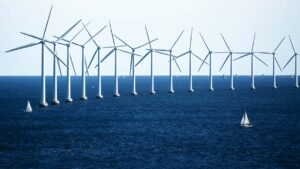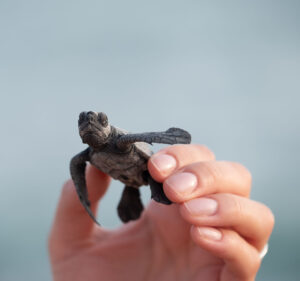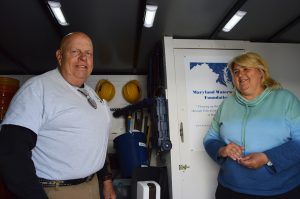Nobody likes to pull into a marina and see plastic beer carrier rings, straws, cups and other discarded items cluttering up the waterway. Even though we try to clean up after others and ourselves, debris continues to appear on the shoreline and water. Fortunately, many companies have come up with innovative solutions to help our eco-friendly boating efforts. Here are some of their latest ideas.
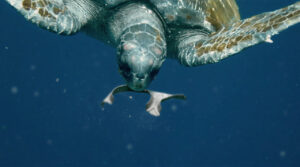
It’s Time to Lose your Six Pack
No, I do not mean packing on belly fat. The six-pack we seek to eradicate is the troublesome beverage holder. Over the years, these plastic beverage yolks have been a deadly component of litter, as marine life can become entangled or ingest them.
PakTech rose to the challenge of reducing the environmental impact from can carriers with injection-molded carriers, which are popular among craft breweries. The design — solid discs that snap onto cans — reduces the entrapment of wildlife. The units are made using high density polyethylene (HDPE) and can be formed into a variety of can holders or beverage handles.
HDPE, or #2 plastic, is one of the most universally recyclable plastics. PakTech carriers are 100% recyclable, but they cannot be included in curbside comingled recycling. Many breweries encourage recycling by offering rewards. Sailfish Brewery in Fort Pierce, FL, hosts a PakTech Give Back program offering products or discounts for collecting and returning their PakTech carriers.
Another product giving the six-pack issue food for thought is the edible six-pack ring. Eco Six Pack Ring (E6PR) is made from compostable materials. These carriers degrade in a week when left in land or water and within days in a compost facility. Saltwater Brewery, a South Florida microbrewery, has partnered with E6PR to produce carriers made with malt, barley and wheat, byproducts of their brewing process. The resulting packaging is highly degradable and edible for marine life – perfect for eco-friendly boating outings!
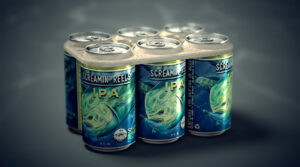
Carlsberg Beer, a Danish beer company, partnered with NMP Systems to eliminate the need for any plastic carrier. Cans are bound together with innovative glue technology. Known as Snap Packs, cans are held firmly in place with dots of glue that release when the cans are twisted apart.
The Milkman Model
In the 1950s, milk was delivered in glass bottles on a doorstep. Empty bottles were set out for pick up and recycling. Companies are reviving this mode of operating to meet the growing desire for a waste-free lifestyle. Consumers purchase the product, but the company owns the container.
A leader in the milkman model platform is Loop. The Loop initiative involves customers ordering groceries from their website or participating stores such as Kroger or Walgreens. Customers pay a refundable deposit fee for the packaging made from glass, metal or plastic. Purchases are delivered in a reusable tote box, which is then used for returning empty containers for a refunded deposit or refill. Familiar industry names such as Proctor & Gamble, PepsiCo, Coca-Cola, Nestlé and Clorox are producing reusable packaging for this new shopping platform.
Does your River Have a Roomba?
The Chicago nonprofit Urban Rivers is designing a robot that lets anyone, anywhere in the world help make rivers cleaner. Urban Rivers stumbled upon the idea after creating a prototype, a floating remote-controlled device that clear debris from the Chicago River.
They discovered it was not just effective, but it was also entertaining. The inventive team embraced the expanded possibilities of their trash robot. With its free roaming movement, much like a water born version of a Roomba, remote controlled access and streaming video they hope to link it to their website as an interactive program. People will be able to play it like a video game.
The conservation project is still in the early stages. A Kickstarter campaign enabled them to install high-powered Wi-Fi, build a trash collection station and tweak the original design. The trash robot concept is a repeatable innovation that could someday be deployed in a river near you.
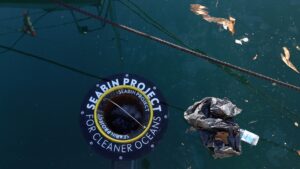
A Small Idea, a Global Impact
In 2013, Pete Ceglinski and Andrew Turton’s journey began with the simple idea: If we can have trash cans on land, then why not on water? By 2014, they launched Seabin and quickly moved from concept to product.
Due to their locations on the water, marinas tend to become natural collection points for floating trash. Seabins are an answer to this litter buildup. Using a submersible pump to draw water and floating debris into a large filtration bag, Seabins function a lot like a water vacuum. Today, 860 Seabins are used in marinas and waterways in more than 70 countries, including the United States. In the future, the Seabin organization hopes to deploy free-floating versions of the device offshore to help gather trash in the ocean.
Even with innovative products, processes and problem solving, plenty of hard work still lies ahead. Consider joining Ocean Conservancy’s International Coastal Clean Up Day, September 19 to really participate in eco-friendly boating. For more than 30 years, volunteers have gathered for the common goal to collect and document littering along their coastlines. Whether collecting on a deserted shoreline, alone or with a group, we can be a part of a worldwide effort. Visit Oceanconservancy.org for more information or download its app, Clean Swell, to help unify our clean-up efforts.
See our other eco-friendly boating tips here, here and here!


